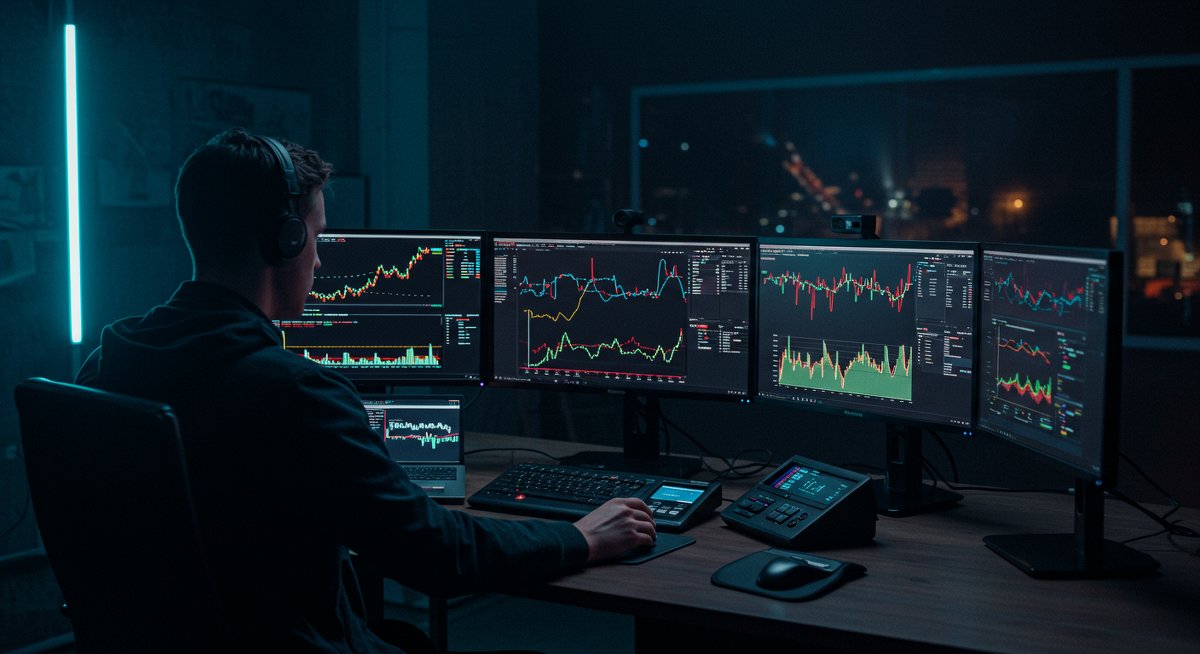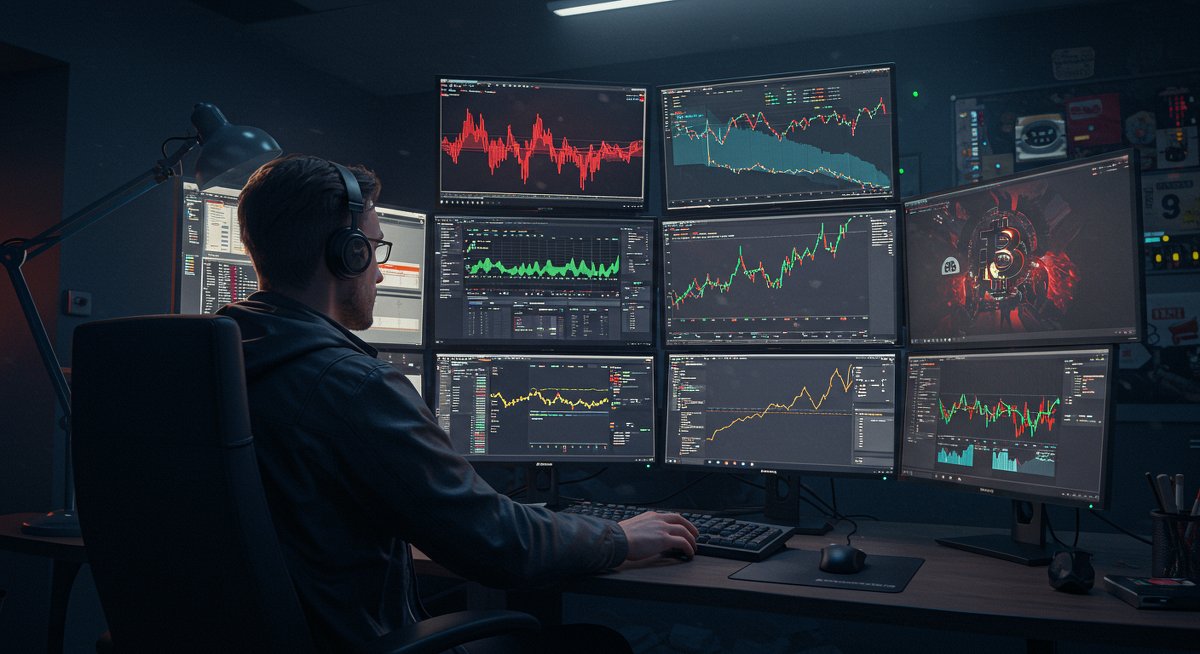Why This Simple Idea Matters So Much
I saw a post on r/Bitcoin the other day that really hit the nail on the head: "Bitcoin is not going up, Fiat is going down." It's a simple statement, but it's one of those things that you need to keep hearing until it really sinks in. Especially if you're trading crypto from outside the US, where currency fluctuations can hit you even harder.
Think about it. We're so used to measuring Bitcoin's success in terms of USD, EUR, or whatever your local currency is. But what if those currencies are the ones that are changing? What if Bitcoin is just staying relatively stable, and it's the value of fiat that's eroding? That's the core of this idea, and it changes everything about how you view your crypto investments.
It got me thinking about all the different factors that contribute to this. Inflation, government policies, global events – they all play a role in weakening fiat currencies. And as those currencies lose value, assets like Bitcoin, real estate, and even stocks can appear to be "going up" when they're really just holding their value against a declining currency.
This isn't just theoretical stuff, either. I've seen this play out in real life, especially in countries with high inflation rates. People rush to buy Bitcoin not because they suddenly became crypto enthusiasts, but because they're trying to protect their savings from being wiped out by inflation. This perspective is especially vital if you're an international trader dealing with multiple currencies and varying levels of economic stability.

Okay, So What's Actually Happening?
Let's break down what's really going on when we see Bitcoin's price jump. It's easy to get caught up in the hype and think that Bitcoin is just magically becoming more valuable. And while increased adoption and technological advancements do contribute to its value, there's a bigger picture to consider.
Fiat currencies, like the US dollar or the Euro, are controlled by central banks. These banks can print more money whenever they want, which can lead to inflation. When there's more money in circulation, each unit of currency becomes worth less. This is where the "fiat is going down" part comes in.
Bitcoin, on the other hand, has a limited supply of 21 million coins. This scarcity is a key factor in its value proposition. Unlike fiat currencies, Bitcoin can't be arbitrarily inflated by central banks. This makes it a potential hedge against inflation.
So, when you see Bitcoin's price increasing in terms of USD, it could mean one of two things (or a combination of both): Bitcoin is actually becoming more valuable, or the USD is losing value. In reality, it's often a bit of both. But the key takeaway is that the value of fiat currencies is not a constant. It's subject to change, and those changes can have a significant impact on the price of Bitcoin.
For international traders, understanding this dynamic is crucial. If you're holding Bitcoin in a country with a rapidly devaluing currency, you might see significant gains in your local currency terms, even if Bitcoin's USD price hasn't changed much. This can create both opportunities and risks, which we'll get into later.
What This Means for Your Crypto Trading Strategy
So, how does this "fiat is going down" idea affect your crypto trading strategy? Well, for starters, it means you need to pay attention to more than just Bitcoin's price chart. You also need to keep an eye on the economic conditions in the countries whose currencies you're dealing with.
For example, if you're trading Bitcoin against the Turkish Lira, you need to be aware of Turkey's inflation rate and monetary policy. If the Lira is rapidly losing value, you might want to consider holding more of your assets in Bitcoin to protect your purchasing power. This isn't investment advice; it's just a way to think about how currency devaluation can impact your trading decisions.
Another thing to consider is diversification. While Bitcoin can be a good hedge against inflation, it's not a guaranteed solution. It's still a volatile asset, and its price can fluctuate significantly. Diversifying your portfolio with other cryptocurrencies, stablecoins, or even traditional assets can help reduce your risk.
I've seen traders in Argentina, for instance, use stablecoins pegged to the US dollar as a way to escape the hyperinflation of the Argentinian Peso. While this isn't a perfect solution (stablecoins have their own risks), it's a way to mitigate the impact of currency devaluation. The point is to consider how the interplay between Bitcoin and your local fiat currency impacts your overall financial health.
Think about the long term, too. If you believe that fiat currencies will continue to decline in value over time, holding Bitcoin could be a way to preserve your wealth. Of course, this is a long-term strategy, and it's not without risk. But it's something to consider if you're worried about the future of fiat currencies.
The Stuff Nobody Really Likes to Talk About (But Should)
Okay, let's get real for a second. While the "fiat is going down" narrative can be exciting, it's important to be aware of the risks involved. I'm not trying to burst anyone's bubble here, but it's crucial to have a balanced perspective.
First of all, Bitcoin is still a volatile asset. Its price can go down as well as up, and it's not immune to market crashes. If you're putting all your eggs in the Bitcoin basket, you could be in for a rude awakening. Always remember the golden rule: never invest more than you can afford to lose.
Secondly, the "fiat is going down" narrative is not a guaranteed investment strategy. While fiat currencies may be declining in value in some countries, that's not necessarily the case everywhere. In some countries, fiat currencies may actually be strengthening against Bitcoin. It all depends on the economic conditions in each country.
Tax implications are another thing to consider. Depending on where you live, you may have to pay taxes on your Bitcoin gains. And if you're trading Bitcoin against different fiat currencies, you may have to deal with complex tax rules. Always consult with a tax professional to make sure you're complying with all the relevant regulations.
I've seen traders get burned by not paying attention to these details. They get so caught up in the hype that they forget to do their due diligence. And then they end up losing money or getting into trouble with the authorities. Don't let that happen to you.
One more thing: be wary of scams. The crypto world is full of scammers who are trying to take advantage of unsuspecting investors. Always be skeptical of anyone who promises you guaranteed returns or asks you to send them money. If it sounds too good to be true, it probably is.
If You're Trading Crypto From Outside the US, Read This
Trading crypto from outside the US adds another layer of complexity to the "fiat is going down" equation. Depending on where you live, you may have to deal with currency controls, capital gains taxes, and other regulations that don't apply to US traders.
For example, in some countries, it's illegal to buy or sell Bitcoin. In others, you may be required to report your Bitcoin holdings to the government. And in still others, you may be subject to high taxes on your Bitcoin gains. It's important to be aware of these regulations before you start trading.
Currency controls can also be a challenge. In some countries, the government restricts the amount of money you can send out of the country. This can make it difficult to buy or sell Bitcoin on international exchanges. You may have to find alternative ways to get your money in and out of the country.
I've spoken to traders in Venezuela who have to use VPNs to access crypto exchanges because the government has blocked them. They also have to be careful about how they store their Bitcoin, because the government could confiscate it if they find out about it. It's a tough situation, but they're determined to use Bitcoin to protect their savings.
Also, remember that the value of Bitcoin can vary depending on the exchange and the currency you're using to trade it. You might see a different price on a US exchange than you see on a local exchange. This is due to differences in supply and demand, as well as currency exchange rates. Always shop around to find the best price.

Actually Doing This Stuff: A Quick Guide
Okay, so how do you actually put this "fiat is going down" idea into practice? Here's a quick step-by-step guide:
Research your local economic conditions: Find out what the inflation rate is in your country and what the central bank is doing to manage the economy. This will give you a sense of whether your local currency is likely to rise or fall in value.
Choose a crypto exchange: If you're just starting out, Changelly is a user-friendly platform, and if you're more experienced, KuCoin is the place to be. Make sure the exchange supports your local currency and complies with all the relevant regulations in your country.
Fund your account: You'll need to deposit some fiat currency into your exchange account to buy Bitcoin. Be aware of any currency controls or transaction limits that may apply in your country.
Buy Bitcoin: Once you've funded your account, you can buy Bitcoin. Consider using a dollar-cost averaging strategy, where you buy a small amount of Bitcoin on a regular basis, rather than trying to time the market.
Store your Bitcoin securely: Once you've bought Bitcoin, you'll need to store it in a secure wallet. Consider using a hardware wallet, which is a physical device that stores your Bitcoin offline. This will protect your Bitcoin from hackers.
Monitor your investment: Keep an eye on the price of Bitcoin and the value of your local currency. If your local currency is declining in value, you may want to consider holding more of your assets in Bitcoin. Be aware of the tax implications of trading Bitcoin in your country.
Stay informed: Keep up-to-date on the latest news and developments in the crypto world. This will help you make informed trading decisions.
My Take on All This Bitcoin Stuff
So, what's my overall take on this "fiat is going down" idea? I think it's a valuable perspective to consider, especially if you're trading crypto from outside the US. It's a reminder that the value of fiat currencies is not a constant, and that it's important to pay attention to economic conditions in the countries whose currencies you're dealing with.
That being said, I don't think it's a foolproof investment strategy. Bitcoin is still a volatile asset, and its price can go down as well as up. It's important to be aware of the risks involved and to never invest more than you can afford to lose.
I also think it's important to be skeptical of anyone who promises you guaranteed returns or asks you to send them money. The crypto world is full of scammers, and it's easy to get burned if you're not careful.
But overall, I'm optimistic about the future of Bitcoin. I think it has the potential to be a valuable hedge against inflation and a way to preserve wealth in countries with unstable currencies. But it's important to approach it with caution and to do your own research.